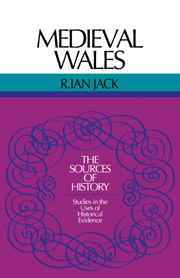Book contents
- Frontmatter
- Contents
- Abbreviations
- General Editor's Introduction
- Preface
- 1 Literary Sources
- 2 The Official Records of Wales and Their Preservation
- 3 The Records of the English Government
- 4 Archives of Individuals and Corporations
- 5 Ecclesiastical Records
- 6 The Antiquaries
- 7 Archaeology and Numismatics
- 8 Cartography and Place-Names
- 9 Conclusion
- Index
5 - Ecclesiastical Records
Published online by Cambridge University Press: 07 October 2011
- Frontmatter
- Contents
- Abbreviations
- General Editor's Introduction
- Preface
- 1 Literary Sources
- 2 The Official Records of Wales and Their Preservation
- 3 The Records of the English Government
- 4 Archives of Individuals and Corporations
- 5 Ecclesiastical Records
- 6 The Antiquaries
- 7 Archaeology and Numismatics
- 8 Cartography and Place-Names
- 9 Conclusion
- Index
Summary
Just as the main series of Chancery records produced by the secular administration of medieval Wales has been lost, so the ecclesiastical records are gravely deficient. A remarkable amount of information can still be amassed about the activities and personnel of the Church in Wales. Dr Conway Davies has published two volumes of documents produced by the pre-Conquest Church, and Professor Glanmor Williams has written a massive, and exemplary, history of the Church ‘from Conquest to Reformation’. But the sources published by Dr Davies are not, in the main, ecclesiastical archives maintained by the Church over the centuries: they are compiled from all manner of records mainly created by the recipients of the grants. And Professor Williams would be the first to agree that in writing his book he was largely deprived of basic records which every historian of the English Church in this period would regard as his birthright.
The fundamental ecclesiastical record is the episcopal register. The register was the official copy of business transacted by the bishop as ruler of his diocese. In some ways registers resemble the Chancery rolls of the royal administration, but differ in one vital respect: they often contain copies of letters received as well as letters despatched. To this extent, therefore, they are a fuller record than the Chancery rolls: on the other hand, they are much more selective. It is clear that copies were kept only of letters felt to be of importance.
- Type
- Chapter
- Information
- Medieval Wales , pp. 125 - 160Publisher: Cambridge University PressPrint publication year: 1976



